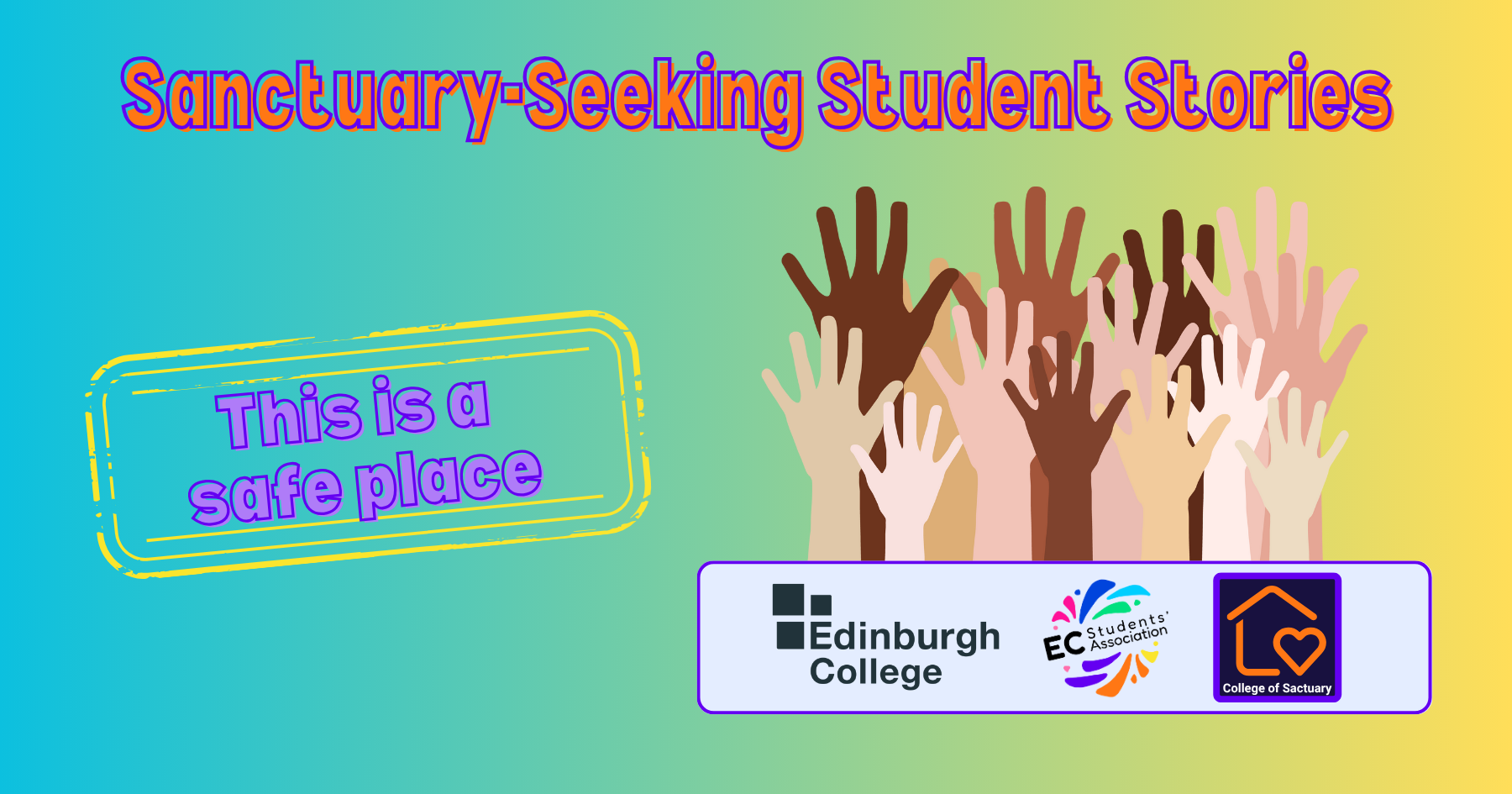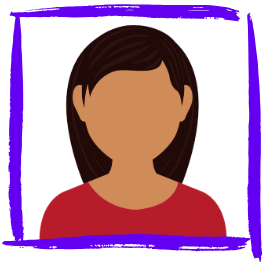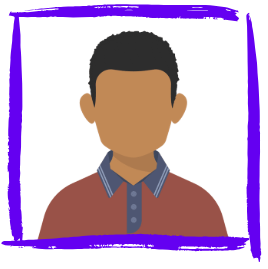Refugee Week 2025 - Student Stories

Over the past couple of months, as part of the College of Sanctuary Project, we have gathered some stories from students at Edinburgh College who have experience of the asylum and refugee system. Through interviews and translations, we have allowed them to tell us about their journeys. We will continue to add to this page, highlighting where they have come from, why they left their home countries, what it means to be at Student at Edinburgh College, and how we can help support them. Here are their (anonymised) stories.
- Story 1 - Woman, mid-twenties, from Iraq
- Story 2 - Woman, late twenties, from Afghanistan
- Story 3 - Man, thirty, from Syria
Story 1 - Woman, mid-twenties, from Iraq
 Section 1: Your Journey to the UK
Section 1: Your Journey to the UK
1. Where are you from?
I am from Kurdistan, Iraq.
2. When did you come to the UK?
I came to the UK in 2022.
3. Why did you leave your home country?
I left my country because my family did not allow me to marry the man I loved. So, I had to leave my country with him. Before arriving in the UK, I lived in several countries and experienced many difficulties.
I left Iraq 8 years ago. First, I went to Greece and lived in a refugee camp for 1.5 years. For 3 months, I lived in a tent while pregnant. Later, we shared a small room with other families. Then we moved to Germany and lived there for 3 years. My second daughter was born there.
But the German authorities told us to leave the country and leave our child behind, because she was born in Germany. We refused and had to leave Germany. We came to the UK by boat. The journey was very dangerous. Too many people were on the boat, and I lost sight of my small daughter for a moment in the crowd. Someone threw away my backpack into the sea—it had all my memories from my children’s births and my home. We were all crying on the boat. When we arrived in the UK, we were wet, cold, and hungry.
We stayed in a hotel in England for 3 months and received only £8 per week. My husband became depressed and didn’t leave the room. My older daughter still remembers the trauma of the boat journey.
Eventually, we moved to Edinburgh. Life here is much better. My husband now works, my daughters go to school, and I study at college. I am happy to be in Edinburgh College. It is a good place to study, and I hope to have a better future here.
Section 2: Knowing Edinburgh College
1. Did you study before coming to this college?
I studied until the end of high school in Iraq.
2. How did you hear about Edinburgh College?
My case worker introduced me to the college.
3. What course are you studying & why did you choose to study at Edinburgh College?
I am studying ESOL. I want to improve my English to continue my education and later find a job.
Section 3: The College and Your Life
1. Do you feel that Edinburgh College is a welcoming place for asylum-seekers/refugees?
Yes, the college is a good and welcoming place.
2. How has the College supported you in your journey?
The college helped me learn English and gave me purpose. My English has improved, and I feel more confident.
3. What do you like or not like about studying at the college?
I like studying here, but as a mother of two children, I think the class start time is too early. After taking my children to school and nursery, it is hard to arrive at college on time. Also, the food and drinks at the college café are too expensive for many students.
Section 4: Your Future and Ideas
1. What do you want for your future?
I want to continue my studies and then find a job. I want a better future for me and my children.
2. How can the college help you reach your goals?
The college can support by offering more flexible class times for parents with children and helping us improve our English so we can go to university or work in the future.
3. What can the College do to better support asylum-seekers and refugees studying here in the future?
- Classes could start a little later so parents can take their kids to school before attending class.
- Bus and train tickets should be cheaper or free for students.
- Café prices should be lower, so all students can afford food during the day.
Story 2 - Woman, late-twenties, from Afghanistan
 Section 1: Your Journey to the UK
Section 1: Your Journey to the UK
1. Where are you from?
I am from Afghanistan.
2. When did you come to the UK?
I arrived in the UK in January 2024.
3. Why did you leave your home country?
I had to leave Afghanistan after the Taliban took control in August 2021. My husband worked for the UK council in Kabul, which made it dangerous for us to stay. I was also a midwifery student, and it became impossible to continue my education. In 2022, we received approval to leave and went to Pakistan before coming to the UK. We moved to Pakistan in 2022 and later arrived in the UK in January 2024.
When I came here, I felt depressed and emotionally unwell due to being in a new country and not knowing the language. But after joining Edinburgh College, my English has improved a lot and my mental health has gotten better.
I study four days a week.
My main goal is to learn English well, go back to university to finish my midwifery degree, and find work. I hope the college continues to support us and provide help with transportation, books, and finding jobs.
Section 2: Knowing Edinburgh College
1. Did you study before coming to this college?
Yes, I was studying midwifery at university in Afghanistan.
2. How did you hear about Edinburgh College?
I was introduced to the college through the council.
3. What course are you studying & why did you choose to study at Edinburgh College?
I am studying ESOL. I chose this course because improving my English is the first step toward continuing my education and building a future here.
Section 3: The College and Your Life
1. Do you feel that Edinburgh College is a welcoming place for asylum-seekers/refugees?
Yes, I feel very welcomed, especially by my teacher, Alison, who is very supportive and helps me learn English.
2. How has the College supported you in your journey?
The college has helped me improve my English and guided me on how to apply to university and find work. It has also supported my emotional well-being, especially during my difficult first months in the UK.
3. What do you like or not like about studying at the college?
I like my teacher and the way classes are taught. One thing I find stressful is that after two terms, students who cannot pass are removed from the course. This can cause anxiety and pressure, especially for people struggling with mental health and a new language.
Section 4: Your Future and Ideas
1. What do you want for your future?
I want to improve my English, go to university, continue my midwifery studies, and find a good job in my field.
2. How can the college help you reach your goals?
The college can continue to provide English education and support with university applications, job advice, and guidance for daily life in the UK.
3. What can the College do to better support asylum-seekers and refugees studying here in the future?
The college could help us more with language learning resources, as English is our biggest challenge. Books are expensive, and many students can’t afford them. It would also help if the college could assist us in finding part-time jobs and reduce the cost of bus and train tickets.
Story 3 - Man, thirty, from Syria
 Section 1: Your Journey to the UK
Section 1: Your Journey to the UK
1. Where are you from?
I am from Syria.
2. When did you come to the UK?
I came to the UK in 2023.
3. Why did you leave your home country?
I left Syria because of the ongoing war and political instability. As a Kurdish person, I was facing targeted oppression and discrimination. It was no longer safe to stay, so I had no choice but to leave.
I first went to Turkey, then crossed into Greece, Bulgaria, and eventually got a Bulgarian passport. However, I was homeless and couldn’t find work. I continued through Italy and then Germany, where I lived for two years, but I was deported back to Bulgaria.
Conditions there were very poor, so I made my way to the UK by crossing forests and sea. I arrived in Glasgow in 2023 and reported myself to the police. Now I’m studying at Edinburgh College and trying to rebuild my life. I hope to finish my education and start working soon.
Section 2: Knowing Edinburgh College
1. Did you study before coming to this college?
Yes, I completed nine years of school in Syria.
2. How did you hear about Edinburgh College?
I was referred to Edinburgh College through the Job Sense program.
3. What course are you studying & why did you choose to study at Edinburgh College?
I am studying ESOL (English for Speakers of Other Languages) to improve my language skills. I chose Edinburgh College because it offers a supportive and welcoming environment for refugees, and I want to be able to continue my education and eventually find work in the UK.
Section 3: The College and Your Life
1. Do you feel that Edinburgh College is a welcoming place for asylum-seekers/refugees?
Yes, I feel very welcomed at Edinburgh College. The staff are kind and understanding, and the environment is inclusive and respectful.
2. How has the College supported you in your journey?
The college has helped me improve my English and adapt to life in the UK. The teachers are patient, and the support services have guided me in understanding how to continue my education and eventually find employment.
3. What do you like or not like about studying at the college?
I like everything about the college. The classes are helpful, the staff are friendly, and the college is a safe space to learn and grow.
Section 4: Your Future and Ideas
1. What do you want for your future?
I want to continue my education, find a suitable job, and build a stable and safe life in the UK.
2. How can the college help you reach your goals?
By continuing to support me with language learning and helping me identify career options and training opportunities that match my interests and skills.
3. What can the College do to better support asylum-seekers and refugees studying here in the future?
The college could offer more one-on-one guidance about job pathways and provide more career workshops or mentoring programs tailored for refugees.
